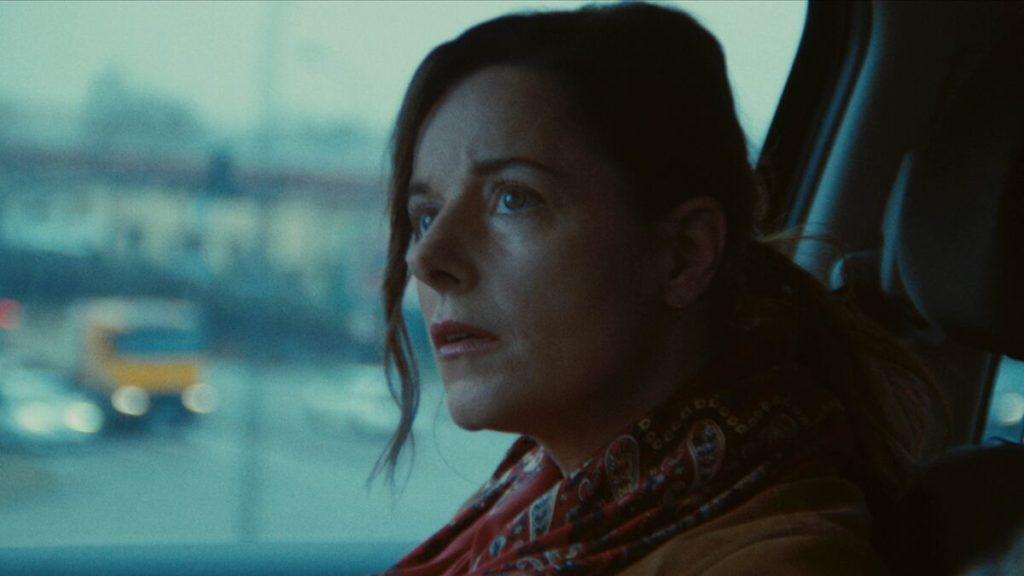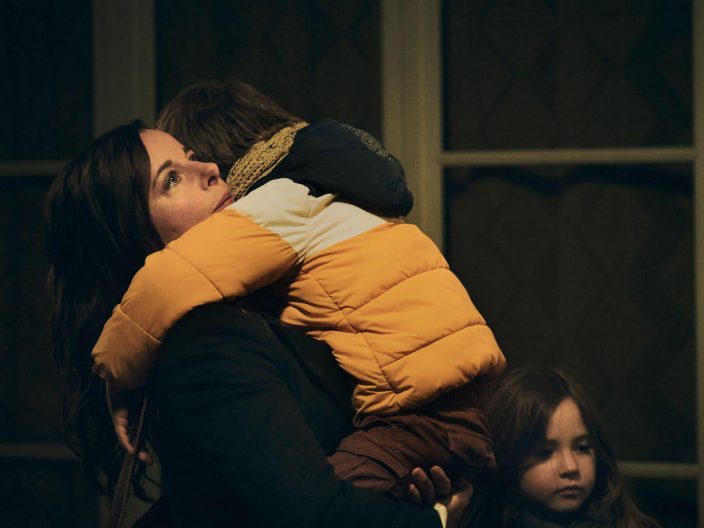In Victor Nunez’ superb 1992 indie drama Ruby in Paradise, a young Ashley Judd fled the Tennessee sticks for a life on her own in Panama City Beach, Florida, eking out a living in souvenir trinket shop. During one key scene she encountered a homeless family on the skids, observing that “most people are no more than two paychecks away from the street.”
Two paychecks seems about right in the riveting Full Time (À plein temps), a French thriller of sorts as exciting as the movies have seen in ages, about a single working mother hanging by a thread—professionally, maternally and financially—over the course of a few stressful days, navigating an avalanche of obstacles and bad luck as she tries, mightily, to keep all balls in the air while attempting to secure a new job.
An unusual amalgam—think Ken Loach social realism by way of the beat-the-clock intensity of Run Lola Run—filmmaker Eric Gravel delivers a high-stakes story with an empathetic character moving at a breakneck pace. It is a tense picture and one bringing urgent fidelity to the screenwriting axiom that protagonists must have challenges thrown at them, again and again, while pushing against hope to prevail.
For Julie (an extraordinary Laure Calamy), everyday is an endurance test. The morning alarm goes off far too early; there’s never enough rest. As a single parent, her two young children need constant tending. The hot water boiler is always on the fritz. Time and money are unobtainable luxuries; there’s hardly any of either.
Residing somewhere outside of Paris, Julie’s crack of dawn routine means dropping the kids with their beleaguered, septuagenarian nanny (Geneviève Mnich)—who takes them to and from school and looks after them until there mother arrives home each evening—before hopping a train into Paris. But as the picture opens, a strike grinds all transit to and from the city to a halt.
Julie works as a head chambermaid in a 5-star luxury Parisian hotel, backbreaking work flipping rooms on a dime and training rookie recruits like the inexperienced Jeanne (Lucie Gallo) while fielding stringent orders from her supervisor, Sylvie (Anne Suarez), and ultra-demanding guests (including an unorthodox power wash of an unfortunately soiled bathroom). “Never be seen” is the mantra for the help, and indeed Julie lives on such invisible margins.
This cutthroat position is, for Julie, a rote prison of protocols and aggressions, and one in which she has spent years away from her chosen career of market research. But a potential job interview with a major retail supply organization—far out of Paris—seems promising. How will Julie get out of work a few hours early without raising suspicions? Once she slips away, can she even travel there? Gravel generates significant suspense in this seemingly ordinary pursuit.
The transit strike in full swing and no trains or buses running, protests clogging the streets and traffic ground to a halt, Julie is often forced, on foot, to race across the city, always late, always in a state of high anxiety and always with much on the line, including threats to her job. Yet the bitter irony is that while she is always in a state of propulsion, her life is cruelly stuck on a stationary, hamster wheel treadmill.
The transportation gridlock also makes it impossible to get home on time in the evenings, threatening her childcare situation and evoking mention of a welfare intervention. Everywhere she goes, Julie encounters friction—each time her credit card runs there is a fear of decline, each time the phone rings the bank intimates foreclosure and with each news announcement another urban roadblock threatens to derail everything. Sylvie’s increasing suspicions combined with Julie’s tardiness and slipping work ethic endanger her livelihood. Yet amidst the escalating crises, she never lets the children see her maternal mask slip, and with her son’s impending birthday party she is determined to surprise him with a new trampoline.
With a ghosting, deadbeat husband skipping out on alimony, dwindling accounts and Julie’s increasing desperation over winning the new job, Full Time is an excruciating ode to working class necessities, to the struggle of finding the fortitude each morning to put two feet on the floor and forge ahead with what feels like little return. There is no choice—there is only work. Life is reduced to moment-to-moment triage of combative realties requiring real-time react and response decisions. There is never enough time, help, money, sleep, understanding or, later in the picture, food. For Julie, there isn’t the luxury of a moment to herself and no way to relax. Even a late night bath, one of her rare still moments, is to be interrupted.
This precarious house of cards can easily come crashing down, and in a tense scene Julie is confronted with the very real and possible loss of her job, her panic and disorientation palpable. In another telling moment during a job interview, she reveals new information with respect to a career gap which clues us in to how she feels about her current predicament. Like last year’s terrific Emily the Criminal, the deck is stacked against Julie, and in a rigged game the rules—like telling the truth—do not always apply.
Presenting a few days in the life of the working poor sounds like a documentary or case study perhaps ripped from the pages of Barbara Ehrenrich’s 2001 undercover exposé Nickel and Dimed, a collection of first person accounts of low income American lives struggling to achieve basic human needs while facing poverty. But Julie’s frantic routine leaves no such time for existential contemplation; this is not a polemic. Scored to the throbbing synth beats of French electronic artist Irène Drésel, Full Time is intensely cinematic, taking off like a shot and rarely flagging. This balancing act—from a filmmaking point of view, as the camera moves, darts, follows, speeds up and threatens to exhaust us as it does its heroine—is razor sharp in lensing an editing.
Gravel has mounted an at-times excruciating experience of a movie, but not without a few moments of potential peace, including a pair of brief interactions with the kindly father of her son’s school friend, gently played by Cyril Gueï (Hitman). In an impetuous moment, Julie misreads his kindness for something more, and needed.
But the movie is too smart to present a savior where there should not be one. In the final third, as Julie’s situation becomes even more complicated, a marvelous moment involving a train announcement tells us in a brief, wordless shot the toll the many stressors have taken.
Full Time produces a state of anxiety few films can approach. A 97-minute hypnotic nightmare, Gravel’s tale and style tighten like a vice. Throughout, Calamy’s focused, living moment-to-moment performance is a testament to fortitude and sacrifices of all working class single mothers.
4 stars.
Full Time is currently playing at Chicago’s Music Box Theatre.






